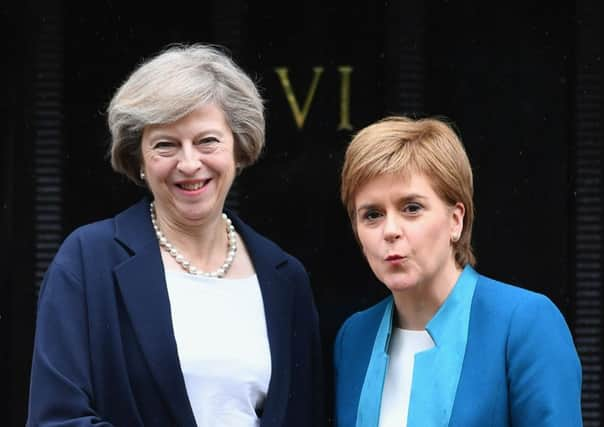Brian Monteith: SNP and the death of the case for independence


In a variety of obvious and sometimes surprising outcomes, such as the resignation of David Cameron and the elevation to Foreign Secretary of Boris Johnson, Brexit has had its effect on every major British party.
With Labour’s journey to Brexit realism and subsequent reconnection with the majority of its own constituencies nowhere near completed, continued political success for the Conservatives is all but guaranteed for the foreseeable future. Theresa May’s election as premier in 2020 is hers to lose – unless she makes an almighty hash of the Brexit negotiations.
Advertisement
Hide AdAdvertisement
Hide AdFor the SNP the problem is far, far greater. British unionists have always known, if not always admitted, there is a rational case for Scottish independence but it has been to their good fortune that the SNP has never articulated it.
For some nationalists, such as the First Minister, who conflate progressive liberal politics with support for technocratic and corporatist European institutions, the EU is a political divinity that cannot be renounced. Then there are the pragmatic nationalists who believe the European Union provides a comfort blanket for reluctant unionists who need something to make the leap out of our 300-year-old union appear seamless, nay, actually a progression.
These two dominant schools of thought have come between the Scottish public and the possibility of a genuine brand of independence that could make an independent Scotland truly prosperous. It is precisely because the current SNP leadership clings to the belief that Scotland must remain “inside” the EU’s so-called Single Market rather than – like Japan, China, India, and the USA – merely have “access” to it, that the SNP has made Brexit the biggest obstacle to it achieving independence.
The First Minister’s proposal for an inclusive and yet separate Brexit arrangement for Scotland is as lengthy as it is pointless. Even were it to be possible, it will be blocked by Spain and others, but moreover it makes two fundamental errors: assuming that controls on immigration are anathema to economic growth and that access to the EU market can be had without any sacrifice to the more important arrangements that provide access to the UK’s single market.
On immigration we can see from other countries, such as the US and Australia, that controlled migration is no barrier to success, indeed it can be argued that it is a prerequisite for ensuring growing economic prosperity is more evenly distributed. For the SNP to not recognise this and ignore the growing concern in Scotland about open-ended EU immigration is to betray a detachment from reality on the ground.
Likewise, it makes no sense to argue that Scotland must be “inside” the EU’s Single Market to protect the 80,000 jobs that are supposedly dependent on trade with its member states – but that to protect the 400,000 jobs, which on the same basis are likely to be dependent on trade with the rest of the UK, we only need “access” to that market and not be “inside” it.
The end game for the SNP and its current leadership is approaching: it will find that for Theresa May no preferential deal with the EU will be considered better than a bad deal and thus what some term a “hard” Brexit, but I believe is more accurately called a “clean” Brexit will be put well ahead of worrying about the SNP calling a second independence referendum.
This does not mean Nicola Sturgeon will not seek to manoeuvre into a grievance-ridden and highly divisive posture that justifies a scintilla of moral outrage so she can demand a further referendum in some Willy Wonka-like hissy fit that fools no-one except her most loyal adherents. For Sturgeon and others that worship at the altar of no-nations European multiculturalism there is no pain that should not be borne in the name of Scottish independence. A fall in economic prosperity, no matter the distress suffered by the weakest in society, will be considered a worthy price to pay for the faux- freedom the SNP recommends.
Advertisement
Hide AdAdvertisement
Hide AdWere it to instead embrace Brexit and develop a new economic strategy built upon the freedom of Scotland to trade with the rest of the world as an independent sovereign nation – then that could prove more attractive than what was offered in 2014. For one thing it could ensure the maintenance of the open border between Scotland and England and it would allow Scotland to have its own immigration policy that reflects its own needs.
Ironically, compared to the SNP, Irish politicians are far more aware of the threat Brexit poses to their country’s economic prosperity that comes from stripping as much as £10 billion of UK Corporation Tax into the Irish treasury – a process that will evaporate overnight when the UK leaves the single market.
The SNP’s continued rejection of a strategic approach that could allow it to mount a convincing independence referendum in a generation’s time is why 2016 has been the year when its decline started. While it will undoubtedly remain the largest political force after next May’s council elections I expect the trend of its contraction at this year’s Holyrood elections to continue.
Last week’s ICM poll showing a quarter of remain voters now wanting a quick Brexit supported the recent YouGov poll showing Scottish dissatisfaction with the idea of a second indyref. In two referendums the British people have spoken and in both cases they now and want their politicians to accept the result and get on with their instructions.
Meanwhile the mounting domestic crises in education, policing, council services, council tax increase and the unravelling SNP budget cannot be levelled at Westminster. Something has to give; next year it will be support for the reputation of Nicola Sturgeon and support for the SNP. l Brian Monteith is a director of Global Britain.